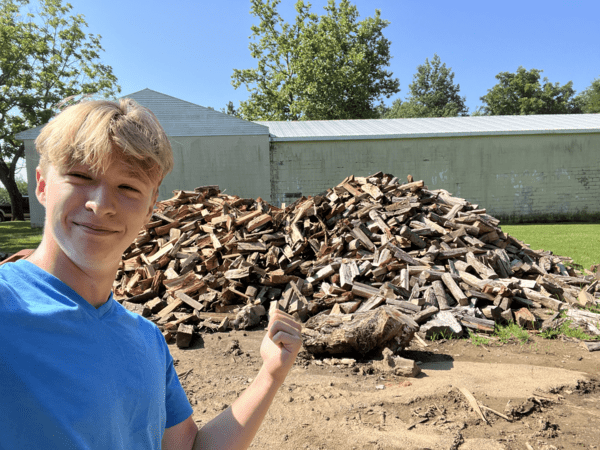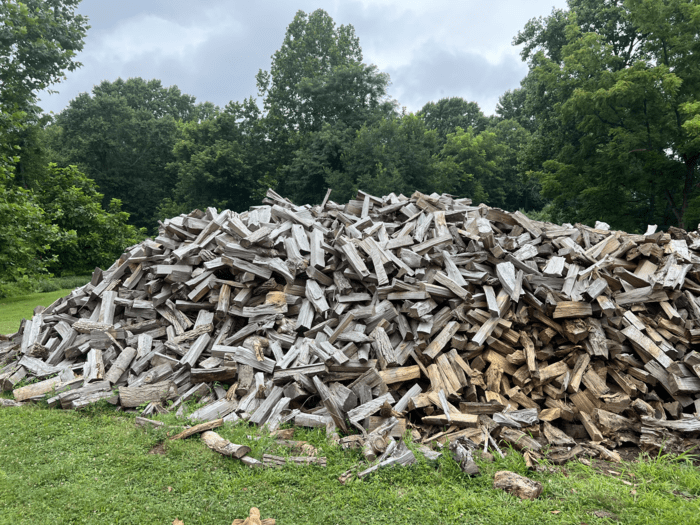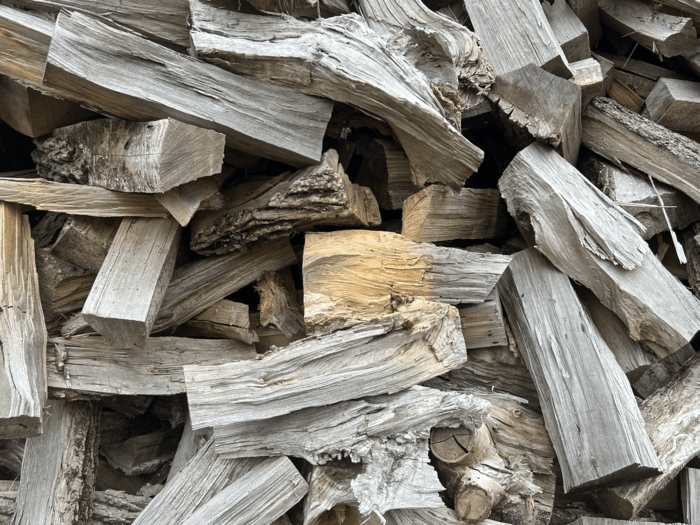A common firewood misconception I hear is needing to “de-bark” your firewood. Splitting wood is an arduous process and adding another step is the last thing people want to do. So, I’m raising the question: is it really necessary to de-bark your firewood?
There is no need to de-bark your firewood. For most wood types, bark will naturally fall off as it dries out. You can split wood with the bark still attached and it’ll fall off on its own. Otherwise, you can let the log sections sit for around three months and the bark will fall off as you split it.
You heard me! There is no need to worry about the bark on your firewood. This is contrary to a lot of articles on the internet, because the writers have never split wood before.
Here’s me in front of my pile for my credentials:

Bark falls off overtime, especially if you let the logs sit!
When we split firewood, we have a system. We get the logs from various tree jobs, let them sit for a few weeks, cut and chunk them into smaller pieces, let them sit for a few more weeks, then split into firewood.
The waiting periods are a sort of methodical laziness. We aren’t too worried about the bark on our wood, but by waiting between each step we let the bark naturally separate from the log as it dries.
This process is sped up if we cut our logs into cylinder sections and then later chunked into quarters. The bark has less log to hold on to.
At the end of the process when we’re at the log splitter, a mound of bark and debris piles around our ankles as we split wood. This is all the bark falling off the log.
Manually de-barking wood does not speed up the drying process.
I’ve never took the time to remove bark from a log. Take a look at my firewood pile later in the season:


You can tell it’s more seasoned. I took these photos for my article: Firewood Will Dry in a Pile! (But not very well…). You can see that as I took away some logs, it’s not as seasoned in the center. If you’re curious, read my article to find out why.
What I want to look at here is the surprising lack of bark in my pile. You can see a few pieces have partial bark on them, but other than that this looks like normal firewood.
I’ve never took the time to take bark off my firewood, because there’s no reason to. It doesn’t rapidly speed up the drying process, make it burn better, or anything that would justify spending time de-barking your wood.
So, don’t listen to anyone who says you need to de-bark your wood before splitting it. You’ll save yourself a headache and days work. Spend that time splitting more wood!
Opposing views saying you should de-bark firewood.
Some people in the firewood community may disagree with me on this topic. Here are the few opposing arguments I’ve heard.
Argument #1: By de-barking your firewood, you can stack more pieces in a chord.
My retort:
Bark burns! It’s just as flammable as the log itself. Why would you take the time to remove it? You’re really just taking away from a piece of firewood to make it smaller. Like I said before, it usually falls off on its own anyway.
Another thing, the hours you spend de-barking wood could have been spend splitting MORE firewood, which would make up for the “lost space” bark takes up. This is a terrible argument.
Argument #2: Bark traps dirt and debris in firewood. So, it’s best to remove it.
My retort:
Never once have I complained that my firewood is too dirty to burn. I’ve peeled logs out of the mud from the bottom of my pile and thrown it on my firewood rack to burn later that week. The mud dries, falls off, and the log burns just fine.
Anyone who says that the bark on a log is trapping dirt needs to split some wood before they write online. Another terrible argument.
